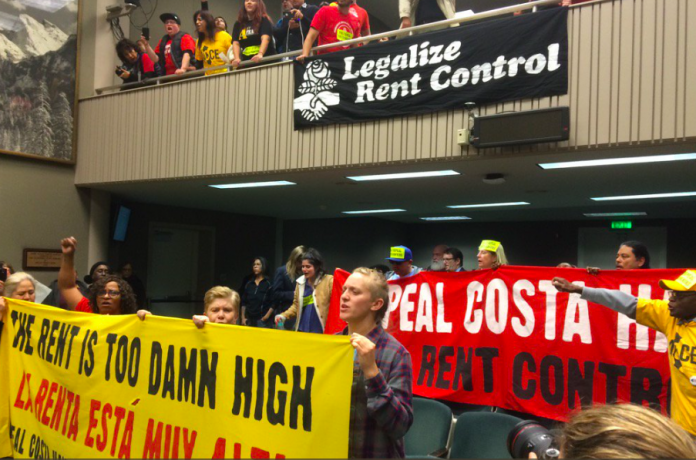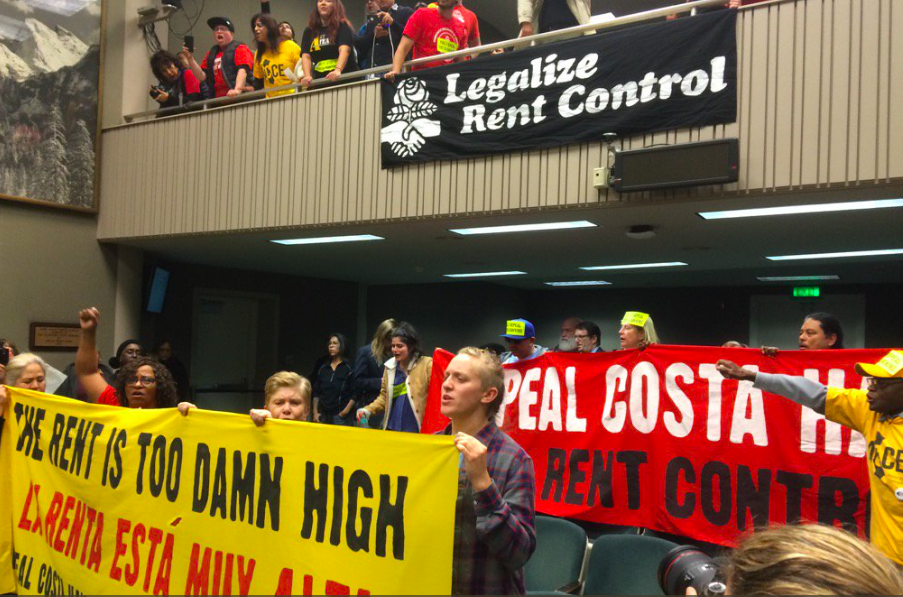
The effort to allow cities to impose effective rent controls failed in a state Assembly committee today after two Democrats refused to vote for the bill.
The repeal of the Costa-Hawkins Act needed four votes to move forward. It died, 3-2, when Assemblymembers Jim Wood of Healdsburg and Ed Chau of Arcadia abstained from voting.

That continues a disturbing pattern of Democrats siding with the real-estate industry on tenant issues. Demorats control the Governor’s Office and have super-majorities in both houses of the Legislature, but the landlords still seem to rule.
Former state Sen. Mark Leno was unable to get even a modest reform of the Ellis Act through the Assembly. Now, this.
Tenants flooded the Capitol and pressed lawmakers to address the epidemic of evictions that are in part responsible for the homeless crisis in California cities. But that wasn’t enough to overcome the power of the California Apartment Association and its allies in both parties.
Protests erupted in the Capitol after the vote, with tenant groups occupying the rotunda.
This is a breaking story, and we will keep you posted.

Blah, blah, blah, blah. I’ve heard the YIMBY BS hundreds of times by now. It does not become true through repetition.
Developers have incentives today to build either condos (with some below market rate housing thrown-in to grease the wheels of the approval process) or luxury rental apartments. That’s because buildings built after 1979 are not covered by rent-control ordinances.
If Costa-Hawkins is repealed, then developers will assume any new rental apartments they build are fair game for rent-control and thus the rational thing for them to do is to build only condos instead. This would essentially stop the construction of new rental housing stock altogether and cause market-rate rents to explode. It would also increase the incentives for Ellis Act evictions. Either way it would accelerate gentrification (only new entrants who can buy a condo outright would move into the city).
The people who make most money are the NIMBYs that stop housing construction and enjoy watching their property prices skyrocket, while couching their naked self-interest in cynical self-righteous pablum about caring for the common resident.
It would seem a bit obvious if a landlord want to convert more than one property. And what good is property if it is not providing income.
It will increase legal evictions as rentals are converted to owner occupied.
On the other hand, vacancy control could have solved the housing crisis without building more units, and more Ellis conversions may be a good thing by creating more owner occupied units; making ownership more affordable.
Awww, how cute….you think a straw man argument is the way to go. You clearly have problems with reading comprehension and logic. They didn’t vote opposite my position, because they did to vote at all. That is a classic political trick when one has to please a financial backer, but does not want to go on record in a way that will hurt them with voters. And since I said nothing like what you claim, that is called a straw man argument. You cannot address what I said, so you pretend to refute something I didn’t say as a distraction.
Seriously, you need to try harder. Much harder.
Wait. So those who vote opposite of your position on an issue are motivated by campaign contributions, while those who support your position are doing so out of morality and virtue?
I can see both sides. And I found one very lacking. You claiming to see both sides is really quite amusing.
“landlords still seem to rule”??
Property owners have ruled Sacramento since 1848, when the first order of business was to legally steal all the land from the Mexican colonists, and the second was to drive away all the Native Peoples from anyplace else. BTW, they also own the legislature and the governor.
Local authorities are responsible for Sundowner laws, speed traps, and slum removal.
Regulations need to be placed on local authorities, as well as States.
I guess out discussion is over – if all you can see is one side. Bye.
Awww, how cute. They didn’t vote “against” it, but they still almost certainly got large amounts of money from landlords for killing it. So, they can play both sides.
It helps prevent major problems, like increases in illegal evictions by making them worthless. By onerous, you mean “prevents theft by scummy landlords.”
No, it returns power where it belongs…something you will never accept, unless of course, it is under the old flag “States Rights.” That was always a popular euphemism.
It doesn’t just allow cities to impose ‘effective’ rent control. It also doesn’t keep them from imposing onerous rent control.
Its odd that the formerly “strick” rent control jurisdiction of Berkeley STILL exempts small property owners from its subsidies, er, I mean, “regulations”.
So the difference btw “effective” and ‘onerous” isn’t – but should – be addressed from a higher authority, whether Costa Hawkins is repealed or not.
Democrats are so far from whom they claim is their base they can’t see them with a telescope.
Yes, we must continue robbing tenants to pay real estate speculators who have bought most of our elected officials. And you are incredibly ignorant if you think developers need incentives to build here, or that filling SF with even more market rate housing will help anyone but real estate speculators and the YIMBYs who make money spreading misinformation on their behalf.
Yeah, it’s analogous to getting just a little bit pregnant — no worries.
Let’s be clear that repeal of the Costa Hawkins Act only hands decisions about rental units back to local jurisdictions. No changes will automatically happen without actions by the local authorities.
Perhaps the lawmakers realize that robbing Peter the new entrant paying higher market prices to pay Paul the incumbent tenant, and making the aggregate situation worse by reducing the incentives for new rental housing construction (and also increasing the incentives for Ellis Act evictions), does not represent sound or fair policy.